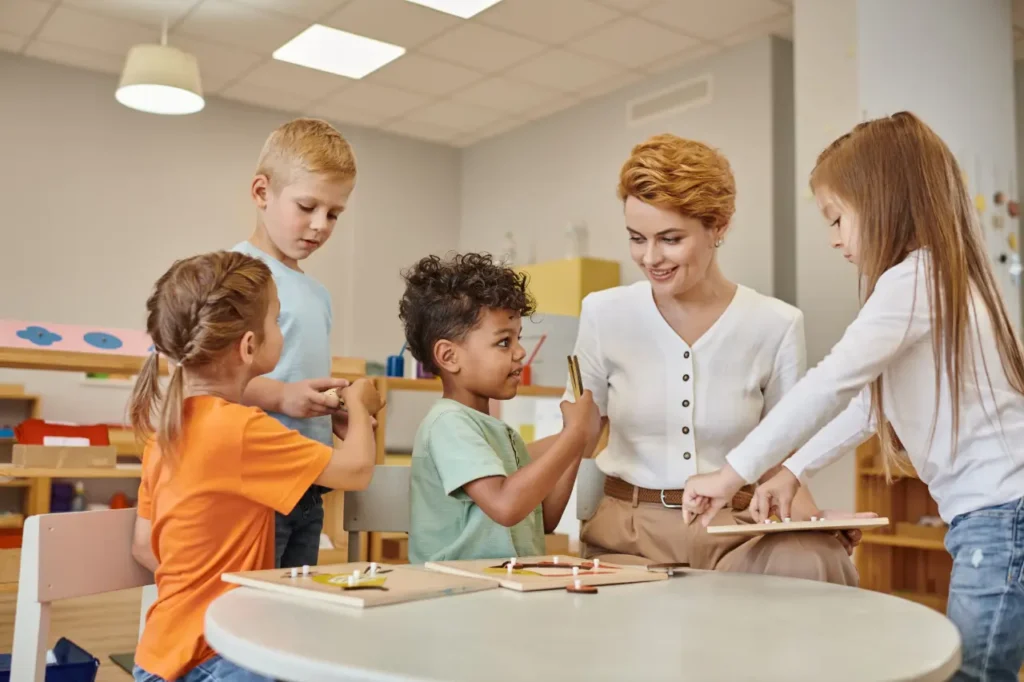The early years of a child’s life are crucial. They lay the foundation for future learning and success.
This period, known as early childhood education, spans from birth to eight years old. It’s a time of rapid brain development, with 90% of a child’s brain developing by age five.
High-quality early childhood education can lead to better outcomes in education, health, and economic productivity. It’s not just about academic learning. It also includes teaching life skills, fostering a love for learning, and promoting social skills development.
In this article, we delve into the importance of early childhood education. We’ll explore its key components, from preschool learning to kindergarten readiness. We’ll also touch upon the role of materials buyers in the early childhood education industry and the value of early childhood education books.
Join us as we uncover the significance of these formative years and their lasting impact on a child’s life.
Understanding Early Childhood Education
Early childhood education is a broad term. It encompasses the learning and development that occurs from birth to eight years old.
This phase is critical for brain development. In fact, by the age of five, a child’s brain has developed 90% of its adult size.
The experiences during this period shape a child’s future. They influence cognitive growth, social skills, and emotional well-being.
Early childhood education can take place in various settings. These include home-based care, child care centers, and formal preschool environments.
Regardless of the setting, the goal remains the same. It’s to foster a love for learning and prepare children for future academic success.
The Role of Child Care in Early Learning
Child care centers play a pivotal role in early learning. They often provide a child’s first structured learning environment.
These centers are not just about supervision. They offer a platform for children to explore, play, and learn.
Through planned activities, children develop key skills. These include literacy, numeracy, and cognitive abilities.
Child care centers also promote social interaction. Children learn to communicate, share, and cooperate with others.
In essence, child care centers lay the groundwork for future academic achievement. They set the stage for lifelong learning.
Key Components of Preschool Learning
Preschool learning is more than just play. It’s a crucial stage where children acquire foundational skills.
Literacy and numeracy are key components. Children learn to recognize letters, numbers, and basic shapes.
Social skills development is another crucial aspect. Children learn to interact with peers and adults in a respectful manner.
Preschool also fosters emotional development. Children learn to understand and manage their feelings.
Here are some key components of preschool learning:
- Literacy and numeracy skills
- Social interaction
- Emotional development
- Cognitive skills
- Physical development
These components work together to prepare children for future academic success.
Social Skills Development in Young Children
Social skills are vital for a child’s overall development. They form the basis for interaction and communication.
In early childhood education, children learn to share and cooperate. They also learn to take turns and respect others.
Conflict resolution is another key skill. Children learn to solve disagreements in a peaceful manner.
These skills are not only important for school. They are essential for life.
In conclusion, early childhood education plays a crucial role in social skills development.
Preparing for Kindergarten: Readiness Skills
Kindergarten readiness is a blend of various skills. It’s not just about knowing letters and numbers.
Social and emotional skills are equally important. Children need to manage their feelings and interact with peers.
Physical skills, like holding a pencil, are also part of readiness. So is the ability to follow instructions.
In essence, early childhood education prepares children for kindergarten. It equips them with the necessary skills for a smooth transition.
The Value of Early Childhood Education Books
Early childhood education books are valuable tools. They introduce young learners to various concepts and themes.
These books can foster a love for reading. They can also enhance language and cognitive skills.
Books with colorful illustrations can stimulate children’s imagination. They can also help children understand complex ideas.
Moreover, these books can be used to teach life skills. They can help children understand their emotions and social norms.
In conclusion, early childhood education books are essential. They provide a fun and effective way to learn.
Toddler Education: The Importance of Play-Based Learning
Toddler education is a crucial stage in early childhood education. It focuses on play-based learning.
Play-based learning is essential for young children’s development. It helps them understand the world around them.
Through play, toddlers can develop fine and gross motor skills. They also learn to interact with their peers.
Play-based learning also fosters creativity and problem-solving skills. It allows children to explore and experiment in a safe environment.
In conclusion, play-based learning is a key component of toddler education. It provides a solid foundation for future learning.
The Role of a Materials Buyer in Early Childhood Education
A materials buyer plays a significant role in early childhood education. They are responsible for selecting and purchasing educational resources and supplies.
These professionals evaluate the educational value of products. They ensure that the materials are safe and suitable for children.
Materials buyers also consider the diversity and inclusivity of the resources. They aim to provide materials that reflect different cultures and family backgrounds.
Their role is crucial in shaping the learning environment. The materials they choose can greatly influence children’s learning experiences.
In conclusion, materials buyers contribute significantly to the quality of early childhood education. They ensure that children have access to the best educational resources.
Conclusion: Why Early Childhood Education Matters
Early childhood education is a critical foundation for lifelong learning. It shapes a child’s cognitive, social, and emotional development.
In essence, investing in early childhood education is investing in the future. It paves the way for a more educated, productive, and responsible society.


